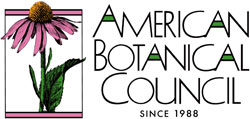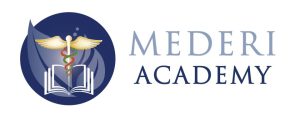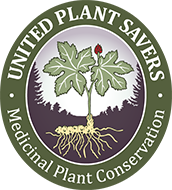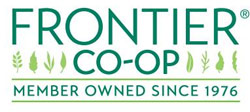Past Conference:
Videos, audio recordings and the digital book from this conference are now available!
Save the Date for 2023: June 2-4, 2023 at UNC Asheville in Asheville, NC
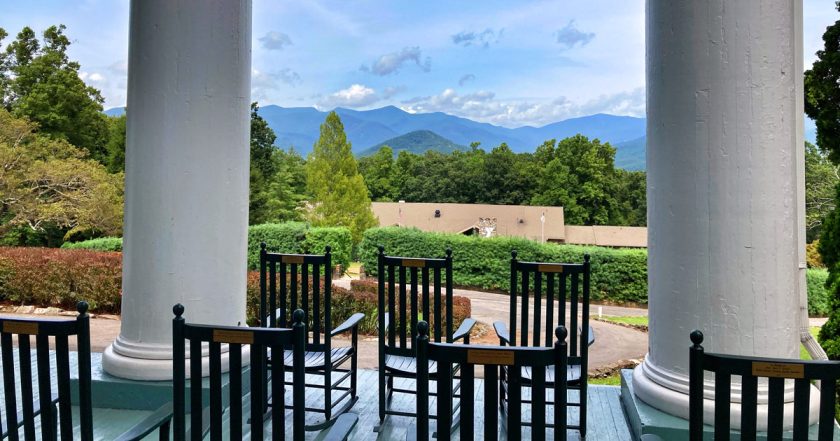
Past Conference
We are delighted to welcome you back in person to the annual Medicines from the Earth Herb Symposium at Blue Ridge Assembly in Black Mountain, North Carolina!
Date: June 3 – 6, 2022
Location: Beautiful Blue Ridge Assembly, Black Mountain, North Carolina
Theme: Botanical Therapies for Restoring Mental Health
Highlights: Over 25 lectures to choose from, two Friday Field Studies, herb walks, and a pre-conference intensive with Kenneth Proefrock, NMD. See speakers and topics below.
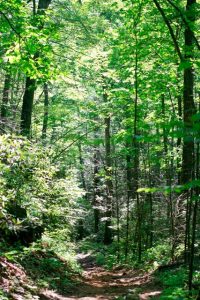
Those who register and attend the symposium in person receive:
- Attendance at all live lectures June 4 – 6 (Friday events, lodging and meals are extra)
- Streaming of all videos made at the symposium for 6 months (except outdoor workshops and herb walks, which won’t be recorded)
- Full set of audio recordings to own
- Digital lecture notes to own
Registration Information: $459
Online registration closes at midnight Wednesday, June 1. After that you are welcome to register at the door.
Cancellations: By May 12, registration fees will be refunded minus $50 processing per registrant. No refunds can be given after 5/12/22. Refund requests should be emailed to the conference office.
Registration fee covers all lectures, panel discussions and other group meetings. Extra fees for intensives, continuing education, lodging and meals.
Scholarships: In recognition of the need for diversity in the fields of clinical herbalism and naturopathic medicine, the conference is offering a limited number of full scholarships to persons of color (Black, Indigenous, Hispanic/Latino, and Asian-American) who are not yet practitioners and would like to further their education in the clinical uses of botanical medicine. Details
FRIDAY PRE-CONFERENCE EVENTS JUNE 3
- Intensive: Compounding Workshop for Acute and Chronic Conditions with Kenneth Proefrock, NMD
- Botanical Adventures and Field Walk with 7Song
- Ecology, Propagation and Cultivation of Native and Oriental Medicinal Herbs with Joe Hollis at Mountain Gardens in Burnsville, NC
Read more about Friday intensives
FEATURED PRESENTATIONS JUNE 4 – 6
Botanical medicine integrated with the latest research, including topics on restoring mental health. More than 25 lectures including:
- Phenotypes of Depression
- Antiviral Herbs Native to the Appalachians
- Epigenetics, Mental Health and Botanical Medicine
- The Impact of Circadian Rhythms on Hormonal Health
- The Meaning and Practice of Spiritual Care in Medicine
- Navigating the Physical Impacts of Long-Term Drug Use with Herbs & Nutrition
- Keynote Panel on Saturday Evening: Inspiring a Way Forward–Navigating the Current Mental Health Crisis
Blue Ridge Assembly
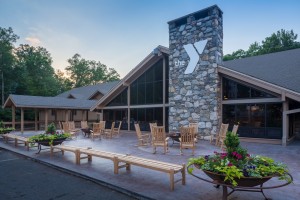
Blue Ridge Assembly, 84 Blue Ridge Circle, Black Mountain, North Carolina
The symposium site is nestled on a mountainside surrounded by 1200 forested acres with two rushing streams. Lodging, dining and lectures are all within walking distance. Blue Ridge Assembly is 40 minutes east of Asheville, NC
Blue Ridge Assembly–much more than just a hotel! Read about it here.
All inclusive lodging and meal packages start at $196 total for three night’s lodging and eight meals. Commuter meals are also available for $80 for the weekend.
Register for lodging and meals online. Blue Ridge does not take reservations by phone. You may also fill out this form and mail or email it to them.
Expanded Registration Hours and Locations
We’ve expanded our symposium registration hours and locations. Be sure to make a note of them so you know where to go when you get there. You only need to check in once to receive a name badge you’ll wear throughout the weekend.
Thursday, June 1 for early arrivals
2 – 7 PM Blue Ridge Center Lobby (after hours see Blue Ridge front desk in the Lobby)
Friday, June 3
9 AM – Noon Blue Ridge Center Lobby
Noon – 8 PM Ware Pavilion (after hours go to Blue Ridge front desk in Lobby)
[5:00 PM Exhibit Hall opens in Pavilion and Joe Hallock and friends entertain with down home mountain music!]
Saturday, June 4
7:30 AM – 7:30 PM Ware Pavilion
Sunday, June 5
8:30 AM – 7 PM Ware Pavilion
Monday, June 6
8 AM – 2 PM When the exhibit hall closes
Friday, June 3
Pre-conference events at Blue Ridge Assembly for an extra fee. Participants may reserve lunch in advance from Blue Ridge here (“Early arrival needs”). Symposium registration required to attend these extra events.
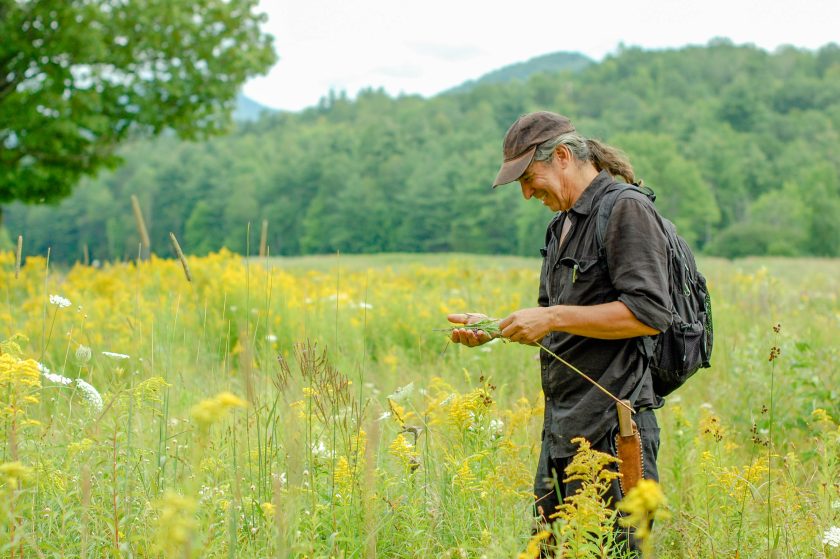
10:00 AM – 3:00 PM
Botanical Adventures and Field Walk
7Song
Sorry, this session is now full.
Join the irrepressible 7Song on a journey through the forests surrounding Blue Ridge Assembly to identify medicinal plants in the wild and learn their clinical uses. He places a strong emphasis on ethical considerations of gathering wild plants and uses his encyclopedic knowledge of botany to show us how to be sure of an ID before harvesting. Please bring a box lunch or arrange for Blue Ridge Assembly to provide a take-out container for your lunch. 30-person limit. ($69)
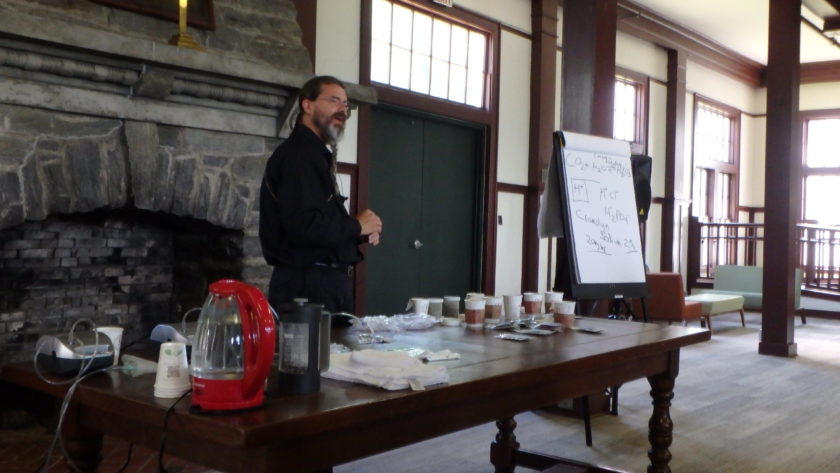
1:00 PM – 5:15 PM
Intensive: Compounding Workshop for Acute and Chronic Conditions
Kenneth Proefrock, NMD
Kenneth Proefrock’s passion for compounding medicines from raw materials translates into unique preparations for hard-to-treat conditions, customized for the individual case. Join us for a demonstration of this specialized art of compounding therapeutics, as it applies to botanical eye drops/eyewashes, nasal sprays/washes, and nebulizer solutions for the treatment of both acute and chronic conditions. Therapeutic agents include Berberis spp, Mahonia, Algerita, Bismuth compounds, Ligusticum, Licorice, Phytolacca, Ceanothus, Scutellaria, Larrea, Nicotiana spp., and amino acids such as N-Acetyl-Cysteine, Glutathione, Agmatine, and Lysine. ($89)
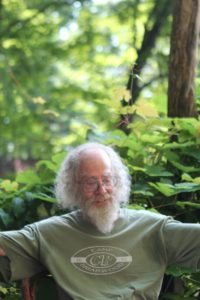
1:00 PM – 5:00 PM
Ecology, Propagation and Cultivation of Native and Oriental Medicinal Herbs at Mountain Gardens
Joe Hollis
Sorry, this tour is full.
Mountain Gardens is a forty-year-old botanical garden incorporating the largest collection of medicinal herbs in the eastern US. Follow expert botanist and horticulturist Joe Hollis on a leisurely plant walk with detailed information on the ecology, propagation and cultivation of the herbs. We also look at the Mountain Gardens nursery, apothecary and seed bank. Limit 20. $59
5:00 PM – 8:00 PM Registration at the Pavilion, Blue Ridge Assembly, Exhibit Hall Opens
Note to early arrivals: If you arrive earlier than 5 PM on Friday, see the schedule below for registration locations.
(5 – 7 PM Live old time mountain music from Joe Hallock & Friends in the Pavilion. Come join the fun!
Saturday, June 4
7:30 AM – 8:30 AM Breakfast (for those who’ve purchased meals beforehand)
7:30 AM – 8:30 AM Registration: Ware Pavilion
8:30 AM – 9:15 AM Opening Meeting:Washburn Auditorium
(Concurrent lectures–choose one–no need to sign up in advance.)
9:30 AM – 11:00 AM
Phenotypes of Depression, Part 1
Mary Rondeau, ND, RH (AHG)
Depression is not a homogeneous disorder. The presence and type of psychomotor and physical disturbance may be important features that help distinguish clinically distinct forms of depressive disorder. The use of translational imaging like quantitative electroencephalogram has provided useful information on the individual subtypes. Physical presentation and the manifestations of those symptoms also help contribute to a better understanding of individual subtypes. Through these distinctions can arise individualized treatments. This presentation will highlight specific phenotypes of depression including brain subtypes, inflammatory subtype and appropriate treatment considerations including medications, botanicals, nutraceuticals and lifestyle medicine.
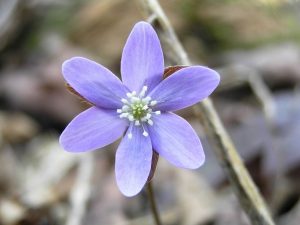
The Damage Done: Navigating the Physical Impacts of Long-Term Drug Use with Herbs & Nutrition
Jen Stovall, BSN, RN
Long-term use of depressant and stimulant drugs can wreak havoc on the body. This presentation outlines patterns of imbalance associated with specific drugs and preventative strategies for support. Because many drugs impact the body systems in predictable ways resulting in similar symptom patterns, we look at both herbal and nutritional protocols that address the long-term impact of drug use. Material presented is informed by the reality that not everyone is able, willing, or ready to quit using drugs and the belief that they still deserve support. We’ll also consider commonly held myths about drug users and best practices that lead to empowerment rather than stigmatization
Outdoor Walk: Woody Plant Medicinals
Marc Williams, MA
Learn how to identify trees and shrubs by the leaves, bark, flowers, fruit and growing conditions, and discuss the plant families to which they belong. Common and obscure uses for woody plants that can support overall health, well-being and sustenance are discussed, along with the connection between woody plants and medicinal mushrooms.
11:00 AM – 11:30 AM Refreshments and Exhibit Break
11:30 AM – 1:00 PM
Phenotypes of Depression, Part 2
Mary Rondeau, ND, RH (AHG)
Depression is not a homogeneous disorder. The presence and type of psychomotor and physical disturbance may be important features that help distinguish clinically distinct forms of depressive disorder. Utilization of tools including QEEG analysis and laboratory testing help determine the specific phenotype of depression which will help build individualized treatments. This presentation will highlight specific phenotypes of depression that include mitochondrial, gut-brain and methylation subtypes.Appropriate treatment considerations including medications, botanicals, nutraceuticals and lifestyle medicine will be provided.
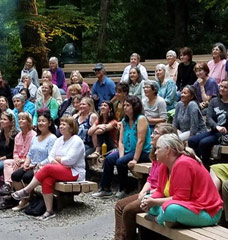 Principal Plants in Herbal First Aid
Principal Plants in Herbal First Aid
7Song
This class will cover some common and useful plants for various types of first aid situations such as injuries, infections, spider bites, pain, and burns. Some of the plants included are Willow, Valerian, Skullcap, Eyebright, Propolis, Licorice, Lobelia, and others.
Antiviral Herbs Native to the Appalachian Mountains
Ruby Daniels, MS
The traditions of Ruby D’s Afro-lachian ancestry run deep in this presentation on the wealth of antiviral herbs growing in our region. Focusing on teas and tinctures, we’ll learn how to harvest, prepare and use these herbs, including boneset, lemon balm, elderberry, and mayapple.
1:00 PM – 2:00 PM Lunch
1:00 PM – 2:30 PM Exhibit Hall open in Pavilion
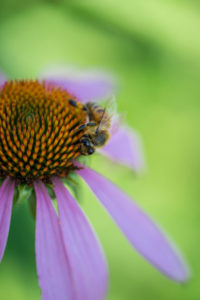
2:30 PM – 4:00 PM
Lost in Translation: Epigenetics, Mental Health and Botanical Medicine
Kenneth Proefrock, NMD
The field of epigenetics, literally, “above” or “in addition to” genetics, includes a multitude of mechanisms that regulate and control genetic expression and protein translation. It is an arena of cellular understanding that is garnering a significant amount of attention from the medical community because it provides a newer avenue for therapeutics while also providing an explanation for the relationship between an individual’s genetic background, their environment, aging and disease and their ability to function and maintain a sense of well-being through life.
Although we begin with a broad and sweeping summation of the science involved in RNA-based epigenetic modifications (including mRNA vaccines and tRNA genetic therapies), we will end up focusing on neuro-psychiatric epigenetics, which represents the progressive edge of understanding how the psychosocial, environmental and spiritual factors impact biological unfolding and modification of DNA and RNA in the constantly remodeling expression of this physical form. We discuss the underlying mechanisms involved in these processes and how these emerging therapeutic strategies might interface with particular nutritional and botanical medicine interventions.
Energetic Herbalism: Understanding the Elements of Plants and Humans for Health
Kat Maier, RH (AHG)
Energetic healing systems work with the elements as the foundational building blocks of tissue, organ function and even spirit. This class will be an introduction to the six elements and six tastes and take a deep look at how these energetics are foundational to an herbal practice. Clinical presentations will reveal how phytopharmacology can be accessed through sensory experience. Herbs to be covered will be the aromatics of rosemary and tulsi, the demulcent tonics of marshmallow and violet, the cooling herbs of the sour rose family, the heating herbal stimulants such as ginger and prickly ash and the sweet nutritive remedies such as burdock and astragalus.
Herb Walk
Doug Elliott
Whether he’s pointing out poison ivy, pontificating on poke sallet, crooning about creasy greens, jiving about ginseng, or extolling the virtues of dandelions, this herbalist, author, and storyteller will delight and amaze you with his broad, practical, scientific and cultural knowledge of the area’s many useful wild plants. Doug has been leading his special brand of herb walks at this event for over 25 years and we welcome him back for another in person fun fest!
4:00 PM – 4:30 PM Refreshments and Exhibit Break
4:30 PM – 6:00 PM
Engaging the Post Pandemic Libido
Katie Stage, ND, RH (AHG)
Pandemic time has not been good for the libido. The change in social patterns and heightened anxiety and depression that has occurred in the last 2 years has had the unfortunate result of decreasing libido for many, if not most. Additionally, exposure to the virus has negatively impacted sexual function for many. This session will review ways to support sexual function and intimacy using lifestyle and herbal medicine.
Targeting VEGF (Vascular Endothelial Growth Factor): A Main Driver in Cancer Angiogenesis and Growth
Donald Yance, CN, RH (AHG)
This lecture investigates the latest research into Vascular Endothelial Growth Factor (VEGF) as one of the drivers in cancer growth. Biomedicine has made great strides in identifying this pathway and creating drugs to address it, and these will receive a thorough review in this lecture. New research has also brought to light ways in which botanical and nutritional medicine can work in concert with these drugs toward a better outcome with reduced side effects. We also summarize potential predictive biomarkers to determine the risk-to-benefit of the use of these drugs– including pathology tests, blood tests, and some clinical pearls based on observational clues. And finally, we discuss herbal extracts and specific herbal and dietary compounds which can modulate and selectively suppress VEGF.
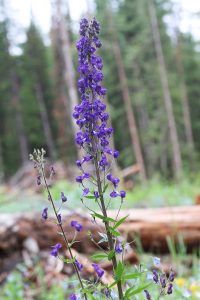
For the Joy of BonBons (Demonstration)
Teresa Boardwine, RH (AHG)
A bonbon is one of the easiest and tastiest ways to deliver herbal medicine and excellent nutrition to those who may not like the taste of teas and tinctures. It is a treat that provides nutrition, delivers medicinal herbs, boosts energy and tastes great. We’ll the creation of bonbons for different medicinal uses. Many ingredients can be added to boost the nutritional value including nuts, seeds, and dried fruits. We also consider how to add these edible herbs, energy boosters, and immuno-modulators that are nutritive and adaptogenic to our recipes: Ashwagandha, Astragalus, Bacopa, Cordyceps, Damiana, Lion’s Mane, Maca, Schizandra, Shatavari, Solomon’s seal, Tulsi and Yucca.
6:00 – 7:30 PM: Dinner and Exhibit Break
7:30 PM – 9:00 PM
Keynote Panel: Inspiring a Way Forward–Navigating the Current Mental Health Crisis
Speakers: Kat Maier, RH (AHG), 7Song, Herbalist and Katie Stage, ND, RH (AHG)
In this panel, three practitioners work together to provide insight into helping patients see a way forward after the stress and isolation of the last two years. First, we’ll hear from herbalist Kat Maier, who takes the Ayurvedic perspective, describing the symptoms of Vata imbalance, which can provoke anxiety as patients seek some stability in these changing times. Treatments to pacify vata include grounding essential oils, herbal nervines and spending more time in nature. Following up in this same vein, clinical herbalist and teacher 7Song will discuss nervines and other herbal medicines that he has found effective in working with mental health issues at the Ithaca Free Clinic. Naturopathic physician and herbalist Katie Stage will address the mental health of families, and especially how to manage depression and anxiety in children and young people and their parents. We will see that we truly have the innate ability to move towards wholeness if we have the right tools.
7:30 AM – 8:30 AM Breakfast
9:00 AM – 10:30 AM
Healing for Our Times through a Five-Step Protocol
Teresa Boardwine, RH (AHG)
This protocol uses herbs, plants, aromatherapy and other natural allies to create safe boundaries, energize the psyche, and strengthen, protect and heal. The curative power of the natural world continues to amaze even the most scientifically based herbalists, naturopaths and energetic practitioners. By helping to integrate the Mind and Body with Spirit, plants enable physical alignment with spiritual energy to work on all levels. Some examples we’ll look at:
- Healing Tonic for times of stress: Motherwort and St John’s Wort
- Resilience: Eleuthero, Schisandra
- Psycho-neuro Support: Holy Basil, Ashwagandha
- Serenity Tea: Holy Basil, Milky Oats, Meadowsweet. Linden
- Plus essential oils and flower essences.
Plant Walk: Seeing Medicinal Plants through the Eyes of a Wildcrafter and a Clinician
CoreyPine Shane, RH (AHG)
The herbal tradition is a bridge between the natural world and the human world – spending time in the woods harvesting plants, then matching those medicines to the person who needs them. This gives the herbal practitioner three places to work: harvesting ethically and sustainably, understanding health and disease, and the place where the two meet – matching the personality of the plant to the pattern of the imbalance in the person. In this plant walk we will talk about how to harvest each plant in an ethical and sustainable way, as well as how to match these plants to specific patterns of imbalance.
The Impact of the Circadian Rhythm on Hormone and Whole Person Health
Katie Stage, ND, RH (AHG)
Human physiology is highly attenuated by the cycles of light and dark, or the circadian rhythm. Many of us know and expect our plants to grow or change depending on the time of day, temperature, and season. However, human physiology is also exquisitely receptive to time of day, sunlight exposure, and even the season. This session will explore the impact of the circadian rhythm on endocrine health and will include both lifestyle and herbal interventions to support homeostasis.
10:30 AM – 11:00 AM Refreshments and Exhibit Break
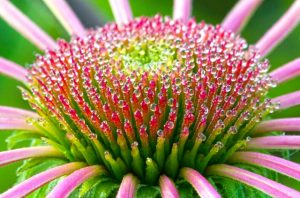
11:00 AM – 12:30 PM
Panel Discussion: Reducing Medication Prescriptions and Side Effects in our Elders
Kenneth Proefrock, NMD, Mary Rondeau, ND, RH (AHG) and Donald Yance, CN, RH (AHG)
“Overmedication is the use of drugs that are not clinically indicated and are given in an inappropriate or overly aggressive manner even when nonpharmacologic alternatives are more suitable. This is an extension of polypharmacy and is caused when age-related changes in pharmacokinetics, pharmaco-dynamics, and potential drug interactions are ignored, when inappropriate drugs are used, or when a drug is prescribed for the wrong diagnosis in elderly individuals. Overmedication can cause adverse drug reactions, increased drug costs, and noncompliance with therapeutic regimens.” Ruiz et al. Avoiding Overmedication of Elderly Patients. Am J Ther. 1996 Nov;3(11):784-788
This quote from 1996 described the problem of overmedication of our elders succinctly and it grows ever more common with each decade. Polypharmacy in the elderly is an increasing issue and medication side effects affect this population greater than younger generations. Co-morbid conditions can make the treatment of mental health and other issues in the elderly more complex. Decreased nutritionally dense diets, decreased volume of food and waning ability of the body to absorb nutrients are all contributing factors to health challenges in elderly adults. This panel will focus on medications that can be the most problematic, concerns with polypharmacy in our elders, plus nutritional considerations and botanical medicines that are beneficial.
12:30 PM – 1:30 PM Lunch
12:30 PM – 2:00 PM Exhibit Hall Open
2:00 PM – 3:30 PM
Spirituality and Healing: The Meaning and Practice of Spiritual Care in Medicine
Donald Yance, CN, RH (AHG)
Spirituality plays a prominent role in the lives of most patients whether or not they formally adhere to a specific religion and belief. Bringing spirituality into clinical practice isn’t necessarily about talking about spirituality, it is about improving empathy, building trust, understanding behaviors and relationships, but most importantly it is about listening.
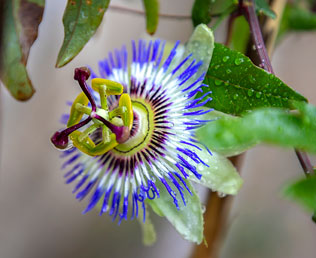
“A few conclusions become clear when we understand this: that our most cruel failure in how we treat the sick and the aged is the failure to recognize that they have priorities beyond merely being safe and living longer; that the chance to shape one’s story is essential to sustaining meaning in life; that we have the opportunity to refashion our institutions, our culture, and our conversations in ways that transform the possibilities for the last chapters of everyone’s lives.” ~Atul Gawande, Being Mortal: Medicine and What Matters in the End
This presentation attempts to provide answers to this crisis in care, and how we might incorporate spirituality into everyday clinical holistic practice.
The One and Only Ashwagandha
Mary Rondeau, ND, RH (AHG)
Ashwagandha is an herb that deserves a deep look at the historical use and evidenced based use of this plant. Ashwagandha has global effects on the body including psychiatric, neurodegenerative, anti-aging, oncology, fertility just to name a few. The presentation will look at the use from an Ayurvedic perspective as well as a Western herbalism perspective.
Plant Walk: Establishing Plant Relations
Kat Maier RH(AHG)
This experiential class teaches simple methods for developing intimate relationships with the plants around us. We employ techniques such as wide angle vision, sketching, organoleptics, journaling, and other methods in order to understand the depth of the relationships that are available to us with plants. We also pay tribute to Goethe and his study of plant morphology.
3:30 PM – 4:00 PM Refreshments and Exhibit Break
4:00 PM – 5:30 PM
The Siren’s Song: Working with Addiction When Someone is Ready to Quit
Jen Stovall, BSN
Drugs, like the song of the siren, can seduce, call us to change our direction, and in the worst case, lure us to our deaths. For some, this song is impossible to resist, even when we are ready to seek treatment. As substance use is pervasive in our culture, herbalists are sure to encounter clients dealing with addiction and seeking support to quit. Because our cultural narrative around drug use does not allow for a tolerance of, much less identification with addiction, herbalists who want to help find there is a lack of practical information about how to provide support. In this class, Jen shares protocols she’s used in her practice to support clients who want to quit using drugs, including opiates, alcohol, and stimulants. Using principles of harm reduction as a framework to provide support, we’ll examine conventional concepts of addiction from various angles as we explore alternative ways to support those ensnared by the perilous song of the siren.
All About Dandelions: Medicinal and Holistic Applications
Marc Williams, MA
Dandelions (Taraxacum spp.) are plants known by many people wherever they grow in the world. They are beloved by some and hated and poisoned by others. In this talk, we will address the provenance of various dandelion species. Beyond that we will cover a multitude of applications of dandelions including food, medicine and beauty. The concept of turning what some consider a problem into a beneficial component of sustainable systems will help form the discussion about these plants and the exploration of the concept of exotic invasive species in general. A few recipes for delicious preparations with dandelions, a show and tell with tasting along with some thoughts about their other ecosystem functions will round out the presentation.
Herb Walk
Doug Elliott
Refresh yourself in the beautiful Blue Ridge Assembly forest with Doug, the consummate storyteller, entertainer and harmonica player. Scientific medicinal plant information and folklore are combined in a seamless whole in this walk on the wild side!
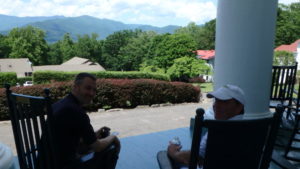
6:00 PM – 7:00 PM Dinner and Exhibit Break
7:00 PM – 8:30 PM
Herbal Stories and Songs with Teresa Boardwine (Fireside program in the amphitheater)
Stories of healing from the last few years. Songs inspired by plants and the natural world to build community and support personal healing. Come to tell a story of healing, sing a song, or just be.
Monday, June 6
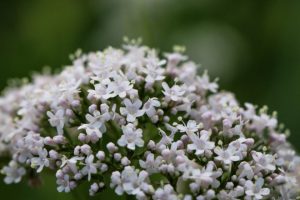
7:30 – 8:30 AM Breakfast
8:30 AM – 10:00 AM
Archaic Techniques of Ecstasy: Exploring Botanical Medicine through the Work of Mircea Eliade
Kenneth Proefrock, NMD
When Mircea Eliade wrote the classic text with the same sub-title in 1951, he was writing as a historian of religion, synthesizing the approaches of psychology, sociology, and ethnology to study the figure of the ‘shaman’, at once magician and medicine person, healer and miracle-doer, psychopomp, priest, mystic, and poet. In similar fashion, we walk back through Eliade’s work and draw out the botanical agents that have been used worldwide as plant allies and inducers of altered states of consciousness by the people that Eliade described as ‘Shamanistic’. We will discuss current and historical uses of the traditionally ‘shamanic’ Siberian plant allies tobacco (Nicotiana spp) and Amanita muscaria as well as the similarly employed Native American plant allies Haemia salicifolia, Salvia divinorum, Ephedra spp, Trichocereus pachanoi, Sophora secondiflora, Datura spp, Ipomoea violacea, and Anadenanthera colubrina and peregrina.
SIBO, IMO and More! Updates on the Treatment of Intestinal Bacterial Overgrowth
Katie Stage, ND, RH (AHG)
Small intestinal bacterial overgrowth (SIBO) is a common underlying condition in those with functional dyspepsia, irritable bowel syndrome (IBS), and persistent GI symptoms including bloating/gas, abdominal pain, and diarrhea or constipation. Identifying and treating SIBO and intestinal methanogen overgrowth (IMO) can provide lasting relief of these symptoms/conditions. This session will explore the latest research and treatment options, both pharmaceutical and natural, on this topic.
Topical Herbal Treatments
Ruby Daniels, MS
A demonstration of the preparation of topical herbal applications such as liniments, bath infusions, salves, soaps and insect repellent, using easily grown or harvested medicinals, including witch hazel, lavender, prickly ash, wintergreen, cayenne and more.

10:00 AM – 10:30 AM Refreshments and Exhibit Break
10:30 AM – 12:00 PM
The Calcium Paradox: Friend or Enemy?
Donald Yance, CN, RH (AHG)
In this presentation we go deeply into the current biomedical research on calcium and calcification-related diseases. Calcium is the most abundant mineral found in the body; about 99 percent is in bones and teeth, and the remaining 1 percent is found in blood and soft tissues. Calcification-related disorders or displaced calcium are a major contributing factor to chronic disease, including heart disease, cancer and arthritic diseases. This presentation looks at causes, the relationship of pH and acidosis to this condition, and an important lab test to use when calcification may be present. The management plan includes nutritional agents, the role of herbal medicine and specific herbs, dietary considerations and life-style suggestions.
Deep Medicine and Inflammation–How Health is Tied to the Human Condition
Kat Maier, RH (AHG)
Inspired by the recent book Inflamed: Deep Medicine and the Anatomy of Injustice by acclaimed physician Rupa Marya and award-winning writer and filmmaker Raj Patel, this class will look at the epidemic of inflammatory diseases in the U.S. and the patterns of distribution of these conditions through various populations We will focus on diabetes and hypertension, using an energetic framework to discuss how practitioners can work with plant medicine on a deeper level to address not only the pathologies rising from inflammatory states but how, with our plant medicines, we can address the deficiencies arising from the paucity of resources available to so many.
Herb Walk
Doug Elliott
Laugh and learn as Doug guides you through a wealth of medicinal herbs and regales you with stories of the plants, the medicines and the people of the Appalachians.
12:00 PM – 1:00 PM Lunch and Exhibit Break (Exhibit Hall closes at 1 PM Monday)
1:00 PM – 2:00 PM
Closing Panel: Favorite Appalachian Medicinal Herbs
Panelists: Teresa Boardwine, RH (AHG), Marc Williams, MA, CoreyPine Shane, RH (AHG) and Ruby Daniels, MS
Our dedication to protecting the endangered medicinals of the world takes root in this panel discussion. Medicinal herbs have been shipped out of the Southern Appalachians for almost 200 years, and many of the popular herbs are becoming rarer in the wild. And yet there are medicinal plants that are abundant here. Some are native plants that are seldom written about, and some are invasive plants with long histories of medicinal use elsewhere that could easily be harvested without overly impacting the environment. We will discuss some herbs in both categories in this panel. Don’t forget that the most humble herbs growing locally can have wide-ranging therapeutic effects either by themselves on in combination with other local plants!
2:00 PM – 2:10 PM Closing
7Song
7Song is director of the Northeast School of Botanical Medicine and practices as a clinical herbalist at Ithaca Free Clinic in Ithaca, NY. A native of the northeastern US, he has nevertheless spent a lot of time in the southwestern deserts admiring, photographing, and wildcrafting plants on his own, and while teaching botany for Michael Moore at the Southwest School of Botanical Medicine. More about 7Song.
Presentations:
1. Friday Field Study: Botanical Adventures and Field Walk
2. Principal Plants for Herbal First Aid
3. Keynote Panel: Inspiring a Way Forward–Navigating the Current Mental Health Crisis
Teresa Boardwine, RH (AHG)
Green Comfort School of Herbal Medicine in the Blue Ridge Mountains of Virginia, is where Teresa Boardwine offers classes, consultations, and online access to her workshops. She has been teaching her hands-on medicine-making classes for over 20 years. More about Teresa Boardwine.
Presentations:
1. Healing for Our Times through a Five-Step Protocol
2. For the Joy of BonBons (Demonstration)
3. Herbal Stories and Songs (Fireside program in the amphitheater)
4. Closing Panel: Favorite Appalachian Medicinal Herbs
Ruby Daniels, MS
With family dating back to the slave plantations of the 1600s in Beckley, WVa, Ruby Daniels (“Ruby D”) refers to her heritage as “Afro-lachian”. She spent many childhood summers in Beckley with her aunts and grandmother, learning about African American traditions, spirituality, native plants and herbal remedies. This motivated her to start experimenting with plants on her own, and later form her business, Creasy Jane’s, named after her great-great-grandmother, Creasy Jane Pack. After earning her Master’s in Therapeutic Herbalism she returned to Beckley and now offers consultations and herbal remedies based in that tradition. More about Ruby Daniels.
Presentations:
1. Antiviral Herbs Native to the Appalachian Mountains
2. Topical Herbal Treatments
3. Closing Panel: Favorite Appalachian Medicinal Herbs
Doug Elliott
For many years Doug earned his living as a traveling herbalist collecting and selling herbs, teas and old-time remedies. Along with healing plants, Doug searches out old-timers and elders from various cultures. From these bearers of tradition, he has assembled an extensive body of knowledge of the botanical aspects of plants, their history, legends, and lore; their uses in various cultures, medicinal properties, food value, as well as other practical ways we can use wild plants every day. More about Doug Elliott.
Presentations:
1. Three Herb Walks
Joe Hollis
Joe Hollis has lectured, consulted and taught workshops in medicinal herb identification, cultivation and processing at Mountain Gardens and at various colleges and conferences in North Carolina for over 30 years. Mountain Gardens sells its seeds, plants and preparations at herb fairs and medicinal herb conferences, and via the internet. More about Joe Hollis.
Presentation:
1. Friday, 1:00 – 5:00 PM: Ecology, Propagation and Cultivation of Native and Oriental Medicinal Herbs at Mountain Gardens
Kat Maier, RH (AHG)
A practicing herbalist for over twenty years, Kat Maier is currently director of Sacred Plant Traditions in Charlottesville, Virginia where she offers a three-year clinical/community herbalist training program. She began studying plants in the Peace Corps in Chile. More about Kat Maier.
Presentations:
1. Energetic Herbalism: Understanding the Elements of Plants and Humans for Health
2. Deep Medicine and Inflammation–How Health is Tied to the Human Condition
3. Plant Walk: Establishing Plant Relations
4. Keynote Panel: Inspiring a Way Forward–Navigating the Current Mental Health Crisis
Kenneth Proefrock, NMD
A naturopathic physician practicing in Sun City, Arizona, Kenneth Proefrock specializes in difficult-to-treat conditions in his clinic, Total Wellness. He is the vice-president of the North American Board of Naturopathic Examiners and chair of the biochemistry portion of the naturopathic physician’s licensing exam. His lectures combine a detailed understanding of biochemistry and physiology with a passion for plant medicine. More about Kenneth Proefrock.
Presentations:
1. Pre-Conference Intensive: Herbal Compounding Workshop for Acute and Chronic Conditions
2. Lost in Translation: Epigenetics, Mental Health and Botanical Medicine
3. Archaic Techniques of Ecstasy: Exploring Botanical Medicine through the Work of Mircea Eliade
4. Panel Discussion: Reducing Medication Prescriptions and Side Effects in our Elders
Mary Rondeau, ND, RH (AHG)
Mary Rondeau ND, RH(AHG) is a registered naturopathic doctor, functional medicine specialist and registered herbalist. Her interest in plants and natural healing stemmed from her upbringing in the Rocky Mountains learning about folk remedies with her mother as a child. More about Mary Rondeau.
Presentations:
1. The One and Only Ashwagandha
2. Phenotypes of Depression, Part 1
3. Phenotypes of Depression, Part 2
4. Panel Discussion: Reducing Medication Prescriptions and Side Effects in our Elders
CoreyPine Shane, RH (AHG)
CoreyPine Shane RH (AHG), founder and Director of the Blue Ridge School of Herbal Medicine near Asheville, NC, has spent over 25 years helping clients and teaching people by artfully blending Chinese and Western herbal traditions with a focus on local plants. His new book “Southeast Medicinal Plants” covers how to identify, ethically harvest, and use the wild plants of the Southeast. CoreyPine has taught across the United States and in Europe, at many national herb conferences, and is a Professional Member of the American Herbalists Guild.More about CoreyPine Shane.
Presentation:
1. Plant Walk: Seeing Medicinal Plants as both a Wildcrafter and a Clinician
2. Closing Panel: Favorite Appalachian Medicinal Herbs
Katie Stage, ND, RH (AHG)
Katie Stage is a naturopathic physician practicing at the SCNM clinic in Tempe. She is a full-time faculty member at SCNM, teaching botanical medicine, hydrotherapy, GYN lab, and clinical skills. More about Katie Stage.
Presentations:
1. SIBO, IMO and More! Updates on small and large intestinal bacterial overgrowth
2. Engaging the Post Pandemic Libido
3. The Impact of the Circadian Rhythm on Hormone and Whole Person Health
4. Keynote Panel: Inspiring a Way Forward–Navigating the Current Mental Health Crisis
Jen Stovall, BSN, RN
A community herbalist and health educator, Jen Stovall believes that herbalism is a potent tool for social justice. Her work as a teacher and practitioner is informed by Western Herbalism, Southern Folk Medicine, and harm reduction practices. She has a BSN-RN and is a NADA Ear Acupuncture Detox Specialist and Trainer. She provides education and outreach for the Trystereo Harm Reduction Collective, a grassroots Syringe Access Program in New Orleans. Her herb school in North Carolina, Terra Sylva School of Botanical Medicine, is focused on centering concepts of bioregional herbalism, embodiment practices, and liberatory frameworks in herbalism More about Jen Stovall
Presentations:
1. The Damage Done: Navigating the Physical Impacts of Long-Term Drug Use with Herbs & Nutrition
2. The Siren’s Song: Working with Addiction When Someone is Ready to Quit
Marc Williams, MA
Ethnobiologist Marc Williams has taught hundreds of classes to thousands of people about plants, humans, other life forms and their interface. His training includes a B.A. in Environmental Studies/Sustainable Agriculture from Warren Wilson College with a minor in Business and a M.A. in Appalachian Studies/Sustainable Development from Appalachian State University with a minor in Planning/Geography. He has spent over 20 years working at various restaurants, farms, and travels throughout 30 countries in Central/North/South America, Europe and all 50 states in the USA. More about Marc Williams.
Presentations:
1. Outdoor Walk: Woody Plant Medicinals
2. All About Dandelions: Medicinal and Holistic Applications
3. Closing Panel: Favorite Appalachian Medicinal Herbs
Donald Yance, CN, RH (AHG)
Donnie Yance, RH (AHG) is a clinical master herbalist and certified nutritionist who is internationally recognized for his comprehensive knowledge and understanding of the healing properties of plants and nutrition. Donnie conducts his clinical practice at the Mederi Center in Ashland, Oregon, utilizing his unique integrative model known as the Eclectic Triphasic Medical System, which he evolved over more than twenty years of successful patient care. More about Donald Yance.
Presentations:
1. Spirituality and Healing – The Meaning and Practice of Spiritual Care in Medicine
2. Targeting VEGF (Vascular Endothelial Growth Factor): A Main Driver in Cancer Angiogenesis and Growth
3. The Calcium Paradox: Friend or Enemy?
4. Panel Discussion: Reducing Medication Prescriptions and Side Effects in our Elders
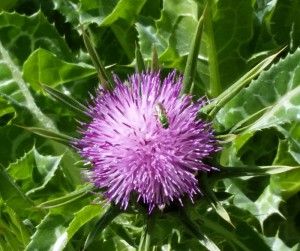
Lodging and Meal Information
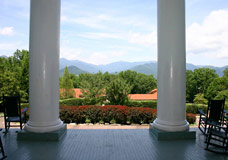
All inclusive lodging and meal packages start at $196 total for three night’s lodging and eight meals. Commuter meals are also available for $80 for the weekend.
Register for lodging and meals online. Blue Ridge does not take reservations by phone. You may also fill out this form and mail or email it to them.
Alternate Lodging in Black Mountain:
Hampton Inn, Black Mountain 828-669-1000
(Tip: Wait through the voicemail prompts and register directly with the front desk)
Quality Inn (828) 669-9950
Super 8 Motel (828) 357-4150
These are both about 10 minutes away
Camping:
The closest campgrounds are in Swannanoa, about 10 minutes away from Blue Ridge Assembly. They offer tent camping, RV hookups and camping cabins. Call KOA at (800) 562-5907 or Mama Gertie’s Hideaway at (828) 686-4258 for reservations.
Airport Transportation
The closest airport is Asheville Regional Airport. Airport van: Diamond Executive Car Transportation. Reservations: call (828) 281-8139 and mention the herb symposium. Please have your flight arrival and departure times ready when you call. Cost: $65 one way from the airport to Blue Ridge (45-minute trip) for one person. Fees are divided up if there’s more than one person per trip.
Cancellations
Before May 12, symposium and intensive fees will be refunded minus $50 processing fee per registrant. No refunds can be given after May 12, 2022. Please make all refund requests by email
Continuing Education Information
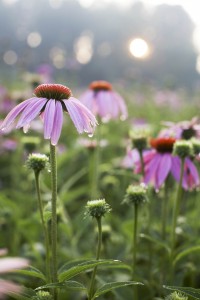
Continuing Education Credits
(Hours listed below include attendance at the pre-conference intensive)
- Acupuncturists: Approved for maximum 21.5 PDA (hours), includes Friday intensive (NCCAOM). NCCAOM approval details.
- Naturopathic Physicians: Approved by OBNM: Maximum 38 CME hours of which 12 can be pharmacy depending on which lectures are attended. OBNM approval details.
- Nursing: Approved for 9 hours Prescribed Credit* with the rest still under review for DO, MD, RN, FNP, California NDs and others (contact us for more information on the pending review)
- Medical Doctors, Osteopathic Physicians and others: Approved for 9 hours Prescribed Credit* with the rest still under review for DO, MD, RN, FNP, California NDs and others (contact us for more information on the pending review)
We will post application status and details of approvals as they are available. Number of credits depends on which lectures are attended.
CE Questions? Contact us and we’ll be happy to help.
Lecture Notes
Lecture notes are compiled into an online book (proceedings) which is available to all registrants at no cost. Before the event, registrants will be sent a link and password to access the digital notes online.
Exhibitors
The exhibit hall will take place in the Pavilion this year. The exhibitors are eager to reconnect with you all! If you’re interested in being an exhibitor, please contact us.
| Schedule Overview | ||||
| THURSDAY, June 2 | ||||
| 2:00 - 7:00 PM | Registration for early arrivals in Blue Ridge Center Lobby (after hours see Blue Ridge front desk in the Lobby) | |||
| FRIDAY, June 3 | ||||
| 9:00 AM - Noon | Registration in Blue Ridge Center Lobby | |||
| 10:00 AM - 3:00 PM | Botanical Adventures and Field Walk 7Song ($69) | |||
| Noon - 8:00 PM | Registration in Ware Pavilion (after hours go to Blue Ridge front desk in Lobby) | |||
| 1:00 PM - 5:15 PM | Pre-conference Intensive: Compounding Workshop for Acute and Chronic Conditions Kenneth Proefrock, NMD ($89) | |||
| 1:00 PM - 5:00 PM | Ecology, Propagation and Cultivation of Native and Oriental Medicinal Herbs at Mountain Gardens Joe Hollis Limit 20. ($59) | |||
| 5:00 PM - 8:00 PM | Registration in Blue Ridge Assembly Pavilion (5 – 7 PM Live old time mountain music.) | |||
| SATURDAY, June 4 | ||||
| 7:30 AM - 7:30 PM | Registration in Ware Pavilion | |||
| 7:30 AM - 8:30 AM | Breakfast: Dining Room in Blue Ridge Center (for those who’ve purchased meals beforehand) |
|||
| 8:30 AM - 9:15 AM | Opening Meeting—Washburn |
|||
| 9:30 AM - 11:00 AM | Phenotypes of Depression, Part 1 Mary Rondeau, ND, RH (AHG) | The Damage Done: Navigating the Physical Impacts of Long-Term Drug Use with Herbs & Nutrition Jen Stovall, BSN, RN | Outdoor Walk: Woody Plant Medicinals Marc Williams, MA |
|
| 11:00 AM - 11:30 AM | • Refreshments • Exhibit Break |
|||
| 11:30 AM - 1:00 PM | Phenotypes of Depression, Part 2 Mary Rondeau, ND, RH (AHG) | Principal Plants in Herbal First Aid 7Song | Antiviral Herbs Native to the Appalachian Mountains Ruby Daniels, MS |
|
| 1:00 PM - 2:00 PM | • Lunch • Exhibit Break until 2:30 PM |
|||
| 2:30 PM - 4:00 PM | Lost in Translation: Epigenetics, Mental Health and Botanical Medicine Kenneth Proefrock, NMD | Energetic Herbalism: Understanding the Elements and Energetic Patterns of Plants and Humans Kat Maier, RH (AHG) | Herb Walk Doug Elliott |
|
| 4:00 PM - 4:30 PM | • Refreshments • Exhibit Break |
|||
| 4:30 PM - 6:00 PM | Engaging the Post Pandemic Libido Katie Stage, ND, RH AHG) | Targeting VEGF (Vascular Endothelial Growth Factor): A Main Driver in Cancer Angiogenesis and Growth Donald Yance, CN, RH (AHG) | For the Joy of BonBons (Demonstration) Teresa Boardwine, RH (AHG) |
|
| 6:00 PM - 7:00 PM | • Dinner in Blue Ridge Center • Exhibit Break until 7:30 PM |
|||
| 7:30 PM - 9:00 PM | Keynote: Inspiring a Way Forward: Navigating the Current Mental Health Crisis Speakers: Kat Maier, RH (AHG), 7Song and Katie Stage, ND, RH (AHG) |
|||
| SUNDAY, June 5 | ||||
| 7:30 AM - 8:30 AM | Breakfast in Dining Room Blue Ridge Center |
|||
| 8:30 AM - 7:00 PM | Registration in Ware Pavilion | |||
| 9:00 AM - 10:30 AM | Help for Our Times through a Five-Step Alignment Protocol Teresa Boardwine, RH (AHG) | Plant Walk: Seeing Medicinal Plants through the Eyes of a Wildcrafter and a Clinician CoreyPine Shane, RH (AHG) | The Impact of the Circadian Rhythm on Hormone and Whole Person Health Katie Stage, ND, RH (AHG) |
|
| 10:30 AM - 11:00 AM | • Refreshments • Exhibit Break |
|||
| 11:00 AM - 12:30 PM | Panel Discussion: Reducing Medication Prescriptions and Side Effects in our Elders Kenneth Proefrock, NMD, Mary Rondeau, ND, RH (AHG) and Donald Yance, CN, RH (AHG) |
|||
| 12:30 PM - 1:30 PM | Lunch Break in Dining Room Blue Ridge Center | |||
| 12:30 PM - 2:00 PM | Exhibit Break in Pavilion | |||
| 2:00 PM - 3:30 PM | Spirituality and Healing: The Meaning and Practice of Spiritual Care in Medicine Donald Yance, CN, RH (AHG) | The One and Only Ashwagandha Mary Rondeau, ND, RH (AHG) | Plant Walk: Establishing Plant Relations Kat Maier RH(AHG) |
|
| 3:30 PM - 4:00 PM | • Refreshments • Exhibit Break |
|||
| 4:00 PM - 5:30 PM | The Siren’s Song: Working with Addiction When Someone is Ready to Quit Jen Stovall, BSN | All About Dandelions Marc Williams, MA | Herb Walk Doug Elliott |
|
| 6:00 PM - 7:00 PM | Dinner in Blue Ridge Center | |||
| 5:30 PM - 7:00 PM | Exhibit Hall Open in Pavilion |
|||
| 7:00 PM - 8:30 PM | Herbal Stories and Songs with Teresa Boardwine (Fireside program in the amphitheater) |
|||
| MONDAY, JUNE 6 | ||||
| 7:30 AM - 8:30 AM | Breakfast in Dining Room Blue Ridge Center | |||
| 8:00 AM - 2:00 PM | Registration in Ware Pavilion until exhibit hall closes | |||
| 8:30 AM - 10:00 AM | Archaic Techniques of Ecstasy: Exploring the History of Shamanism through the Work of Mircea Eliade Kenneth Proefrock, NMD | SIBO, IMO and More! Updates on the Treatment of Intestinal Bacterial Overgrowth Katie Stage, ND, RH (AHG) | Topical Herbal Treatments Ruby Daniels, MS |
|
| 10:00 AM - 10:30 AM | • Refreshments • Exhibit Break |
|||
| 10:30 AM - 12:00 PM | The Calcium Paradox: Friend or Enemy? Donald Yance, CN, RH (AHG) | Deep Medicine and Inflammation Kat Maier, RH (AHG) | Herb Walk Doug Elliott |
|
| Noon - 1:00 PM | Lunch and Exhibit Break (Exhibit Hall closes at 1 PM Monday) | |||
| 1:00 PM - 2:00 PM | Closing Panel: Favorite Appalachian Medicinal Herbs Panelists: Teresa Boardwine, RH (AHG), Marc Williams, MA, CoreyPine Shane, RH (AHG) and Ruby Daniels, MS | |||
| 2:00 PM - 2:10 PM | Closing Meeting | |||
Questions? Contact us.











